Workshop on NAAC Accreditation in association with IQAC
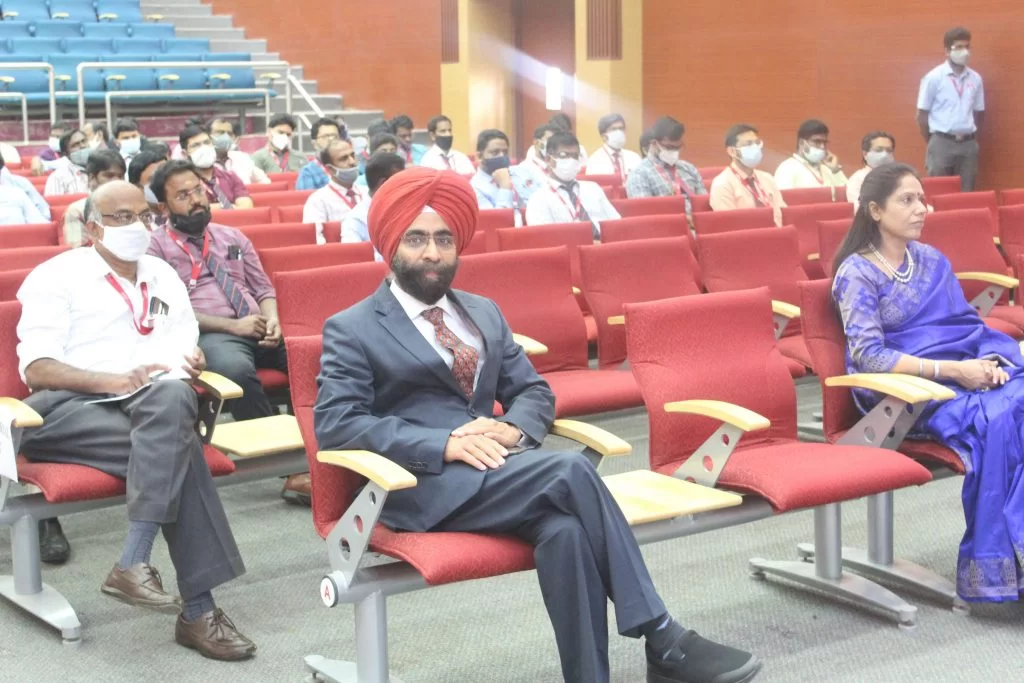
Dr. Manpreet Singh Manna, born on 14th March, 1971, at Patiala, Punjab, graduated in Electrical and Electronics Engineering from Mysore University, in 1993. He did his Master of Engineering in Power and Machines from Thapar University, Patiala, and Ph.D. in Electrical and Instrumentation Engineering from SLIET (A Centrally funded Deemed University established by Govt. of India). Starting his career in teaching as a Lecturer at the Sant Longowal Institute of Engineering and Technology (S.L.I.E.T.) in the year 1997, he rose to the position of Director, All India Council for Technical Education (AICTE) under Ministry of HRD, Govt. of India, on deputation from 2014 to 2018. He also worked as Director of the “SWAYAM MOOCs” project and the Prime Minister Special Scholarship Scheme (PMSSS). He also taught in AIT, Bangkok, for the January-2012 session as Visiting Associate Professor by MHRD, Govt. of India. Dr. Manna has published around 140 Research Publications in leading National and International Journals and has participated in Conferences of repute. He is the Editor and Reviewer for many International Referred Journals. He has delivered Expert Talks on various topics on National TV channels and Institutions in India. He has visited countries like USA, Switzerland, Russia, Thailand, Singapore and China, to Chair the sessions for Invited talks, for presenting papers and on teaching assignments.
Dr. Manna has been conferred with following Awards:
- ‘President Award’ – “COMMENDATION AWARD-2017” from Shri Pranab Mukherjee, the Hon’ble President of India, during the launch of the “SWAYAM PLATFORM” on 9th July, 2017, for his outstanding and pioneering contribution towards the development of SWAYAM (World’s largest MOOCs Platform).
- ‘Editor Choice Education Excellency Award-2019′ for making Indian Education affordable and reachable, from Chairman NBA, during the Dialogue India Academia Awards at Taj Dubai (UAE) on 2nd May, 2019.
- ‘Weaving Dreams Digital Leaders of India Award-2019′.
- ‘Eminent Engineers Award-2017′ from Institutions of Engineers (India) at Ahmedabad.
- Medal of Honour -2018 from World Peace and Diplomacy organization.
- Exceptional Leaders of Excellence, 2017 – the prestigious WEF (Women Economic Forum) Award.
- Innovative Policy Maker Award -2017 from News India and GESA, India.
- Rashtriya Shiksha Gaurav Puraskar-2015 from CEGR, New Delhi.
- ‘Outstanding Faculty Award 2015-VIFFA’.
- ‘Bharat Excellence Award’ and ‘Gold Medal’ from Former Election Commissioner of India.
Objective of the Workshop:
- To create awareness about NAAC and NBA Accreditation and its benefits to higher education Institutions.
- To create awareness about OBE among the faculty – its importance and how it benefits students.
- To facilitate the techniques relating to qualitative and quantitative metrics of NAAC and NBA Accreditation Framework and its significance.
- To identify where the gap is, and think about how to fill the gap in the institution to get a better grade in NAAC & NBA accreditation.
- To facilitate the exchange of experiences among the participants from various institutions, regarding best educational practices, which will ultimately result in quality enhancement.
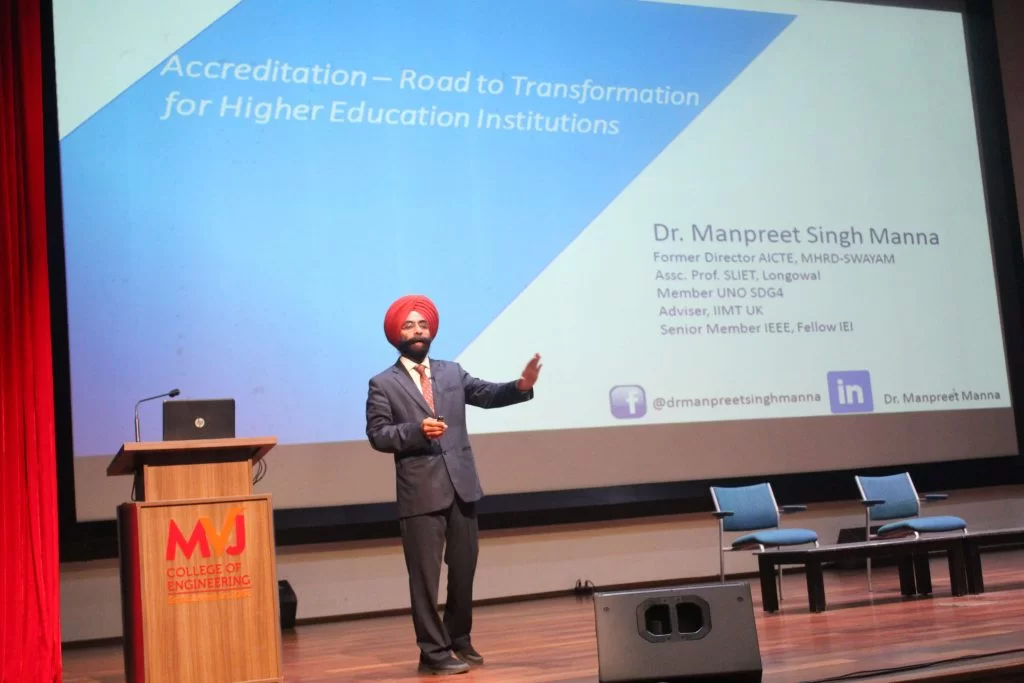
The speaker started the Workshop by elaborating on the importance of the Outcome-based Education (OBE) system. Outcome-based education is student centric instruction that focuses on measuring student performance, i.e. the outcomes. The knowledge, skills and attributes that students take away at the end of a program or course are more valuable than what, or how, something is taught. The next step of OBE is designing an appropriate Outcome based Curriculum. A carefully planned Teaching-Learning process has to be put in place next. While the traditional education system focuses on what is taught, OBE places emphasis on what is learned, and this distinction is very important. OBE focuses on the skill sets that students need to acquire, following the completion of their course. Activities in or outside the classroom are designed in a manner so as to help students achieve these outcomes.
The Workshop had been designed to enlighten the participants on the contents and features that are required for an institution to get a good grade in NAAC accreditation. Dr. Manpreet Singh Manna further explained about the new National Education Policy, 2020 (NEP 2020) which had been approved by the Union Cabinet on 30th July 2020. Human Resource Development Minister Ramesh Pokhriyal and IB Minister Prakash Javadekar had briefed the media on this. One of the provisions of the National Education Policy 2020 (NEP 2020) is the introduction of the Academic Bank of Credit (ABC), in which a student will be given multiple entry or exit options. NEP 2020 offers students the option to discontinue the course after completing a year or two, and get corresponding certification. For example, if a student exits from a course of four-year duration after one year, he/she will get a certificate; for exiting it in two years, they will get a diploma. Academic Bank of Credits will enable students to select the best courses or combination of courses to suit their aptitude, and to tailor their degrees or make specific modifications, rather than undergoing the rigid, regularly prescribed degree or courses of a single university.
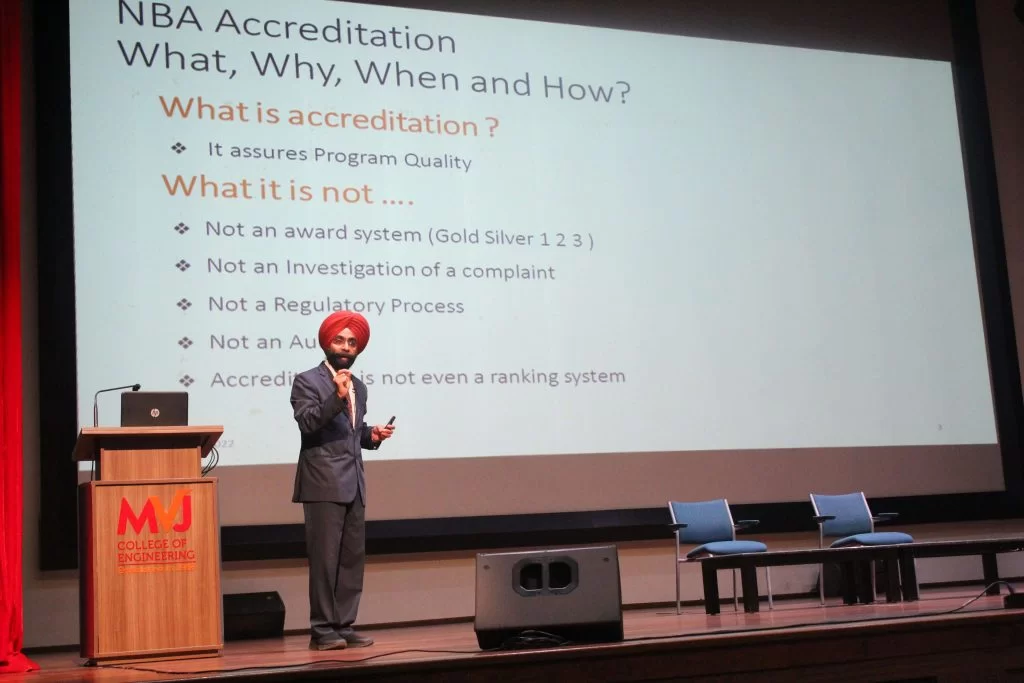
Dr. Manpreet Singh Manna then spoke about the SWAYAM Scheme developed under the guidance of Union HRD Minister Smriti Irani and AICTE (All India Council for Technical Education). SWAYAM – which means ‘Self’ in Sanskrit, is an acronym for Study Webs of Active Learning for Young Aspiring Minds. It is a MOOCs (massive open online course) platform which helps young aspiring minds to learn something new, and to facilitate hosting of online courses which can be accessed by anyone, anywhere, at any time, free of cost, to achieve three cardinal principles of Education Policy, viz. Access, Equity and Quality.
He then focused on the importance of the VIDVAN portal. It is Expert Database, and National Researcher’s Network is the premier database of profiles of Researchers and other faculty members working in leading academic institutions, and other R & D organisations involved in teaching and research in India. It offers research profiles of subject experts in various subjects, from the nation’s leading institutions. It quickly and conveniently provides information about experts to peers, prospective collaborators, funding agencies, policy makers and research scholars in the country. It enables users to establish communication directly with the experts who possess the expertise that is needed by the users. It helps one discover prospective collaborators for on-going research projects. NEP 2020 promotes the idea that Government and Private institutions are on par, if a faculty scores 10/10 in Vidwan, he/she can become an NBA or NAAC evaluator, officially.
Dr. Manpreet Singh Manna also laid emphasis on the concept of flipped classroom. A Flipped Classroom is a blended learning strategy and learner-centred approach that fundamentally utilizes technology to impart education. The concept involves employing online tutorials and to teach academic subjects and convey information. Unlike the traditional teacher-student lecture style, where an educator teaches most part of the lessons directly to students from textbooks inside the classrooms and controls the full flow of class discussions, the flipped classroom model differs by encouraging learners to do research and prepare beforehand on topics at home prior to their teaching during the class periods, and allows students to collaborate via online discussions. To make a new age education system the institution needs Digital curriculum and digital delivery methods. Learning Management Systems (LMS) to teach academic subjects and convey information. Unlike the traditional teacher-student lecture style, where an educator teaches most parts of the lessons directly to students from textbooks inside the classrooms and controls the full flow of class discussions, the flipped classroom model differs in that it encourages learners to do research and prepare beforehand on topics before entering the classroom, it allows students to collaborate via online discussions. To create a new age education system, an institution needs Digital curriculum and Digital delivery methods.
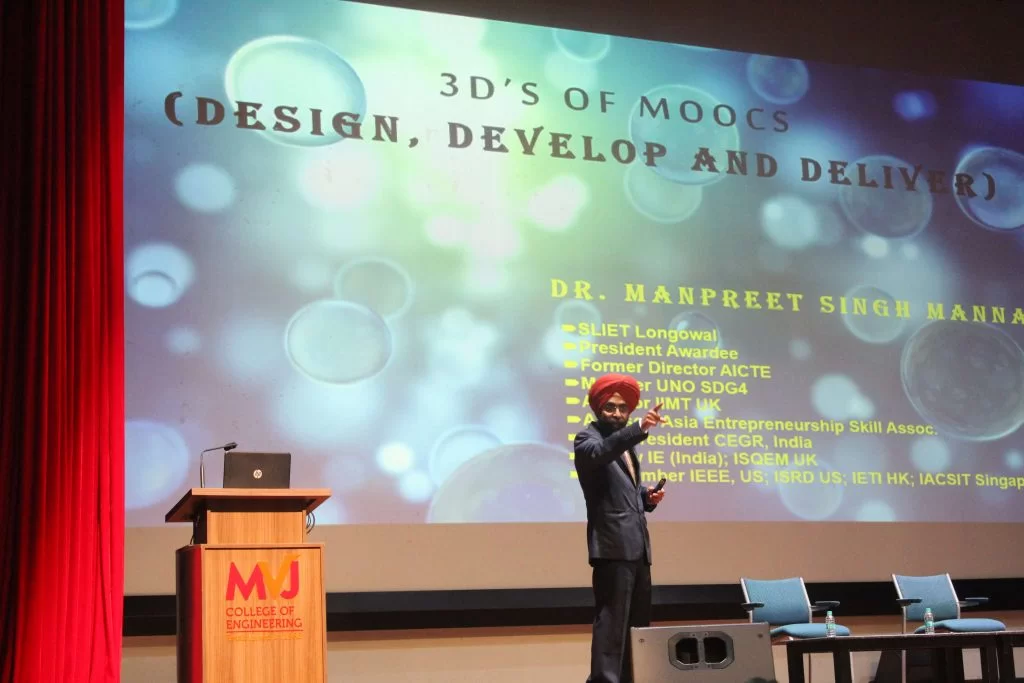
Dr. Manpreet Singh Manna motivated the faculty to start MVJ MOOCs. To start MOOCs (MASSIVE OPEN ONLINE COURSES), first FDPs (faculty development programs) need to be done, and then videos from the selected faculty can be put up – the faculty will be given incentives. MOOCs are a new type of e-learning class, which consist of short video lectures, computer-graded tests, and online discussion forums. MOOCs enable access to quality education to as many people as possible, and contributes to continuous education of various social groups.
Dr. Manpreet Singh Manna also discussed about the AIML (Artificial Intelligence and Machine Learning) Course which was recently started in MVJCE. AI and Machine Learning aim at carrying out tasks that include learning, adapting, performing, processing information, and speech recognition similar to humans. It will help to enhance academic collaborations for better exposure. This improvement in Teaching–Learning is through AI (Artificial Intelligence) – Revised Bloom’s Taxonomy). Earlier, the College had ICT enabled teaching and learning, and now with the introduction of AIML, the college is AI (Artificial Intelligence) teaching and learning enabled. AI helps teachers up their game, providing them all the information that they need. It also allows teachers to create content that suits their students best, while ensuring personalized learning. It automates tasks, so teachers have more time to do more teaching and consequently, impact the students better.
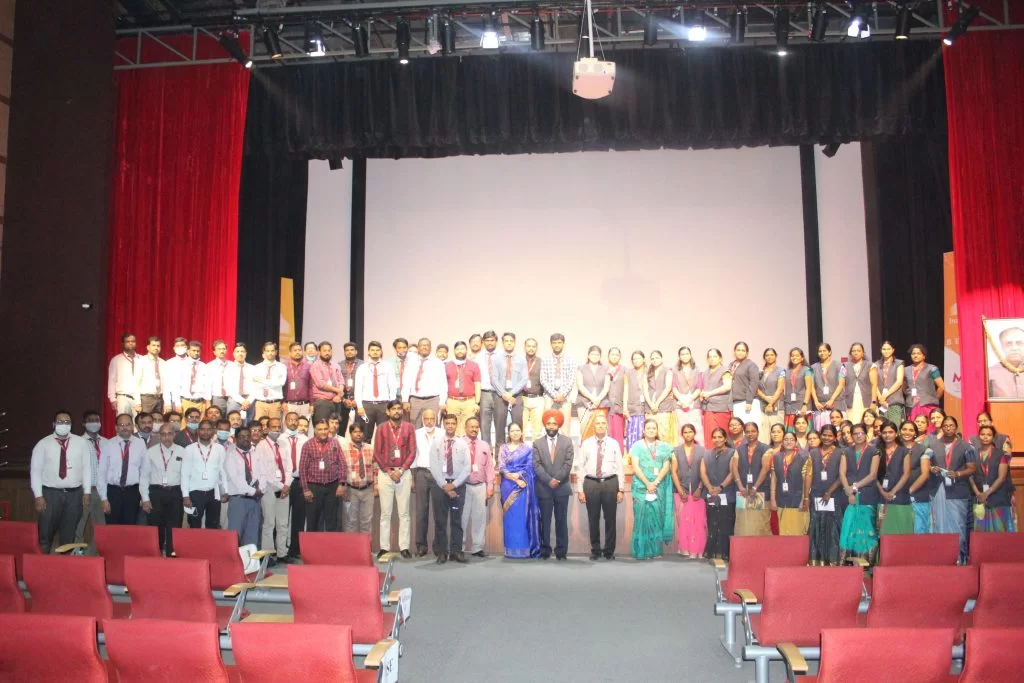
Overall, it was a very fruitful Workshop, Dr. Manpreet Singh laid emphasis on how the Institution should know its strengths, weaknesses and opportunities, and how the Institution should continuously improve in the areas where the they lag. With improved grades in NAAC, opportunities for research funding increase, and this helps in building and facilitating international partnerships in research, and student exchange programs. It increases enrolment, faculty recruitment and better placement activities. At the end of the session, our dear Principal Dr. P Mahaballeshwarapa thanked the participants for their keen interest and active interaction during the sessions.










